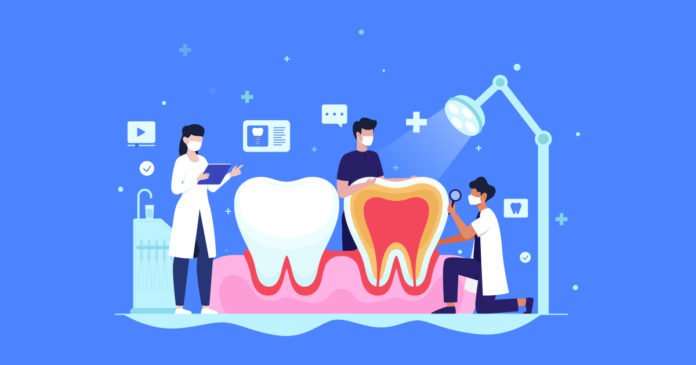Have you ever had a toothache that apparently won’t heal up? Everything gets really annoying and even small daily routine tasks like eating or talking may become hard. Unfortunately, many people have tooth discomfort owing to nerve injury or decay.
Pain in the teeth comes for a variety of reasons such as cavities, gums, and other mouth injuries. It is vital to discover how to stop it as soon as it appears or you will find yourself being in discomfort for a long time. Fortunately, there are a few easy ways, you could employ at home, to relieve pain.
In this article, we will discuss some simple ways to deal with tooth pain including home remedies to advanced treatments. We will also see how to kill tooth pain nerve in 3 seconds permanently. By following these recommendations, you can regain control of your oral health and say goodbye to terrible toothaches once and for all.
Understanding Tooth Pain
What occurs if one has a toothache? It is certainly a spoiler of the productive day, but learning the origin can be a way to find the right remedy.
The first question is what causes tooth pain? There can be several factors that cause it. Sometimes, the reason is decay– that is, the formation of little holes known as ‘cavities’ in your teeth. Another reason might be plaque or gingivitis when your gum is inflamed. Dental trauma is rather an important aspect as well, that is accidents or unintentional damage in the form of cracks, chipped or knocked-out teeth or gums.
Now this is when things become interesting. Have you heard of the dental pain nerve? It is like the messenger that the brain relies on to inform something is wrong with your tooth. Toothache is when your nerve sends signals to your brain making it alert that there is a problem.
Learning this nerve and how it performs is essential to understanding why tooth pain happens. It’s like with a map– as soon as you have identified the cause of the pain, now you can figure out how to stop it.
How to Stop Tooth Pain Fast at Home
Dentists always suggest visiting them as soon as possible, but when you are indeed suffering from a toothache, there are a few home remedies for toothache that you can try to get rid of pain permanently.
1. Oral Rinses
Try saltwater or hydrogen peroxide gargle for immediate relief from any teeth discomfort. This treatment helps reduce inflammation and combat bacteria so you can temporarily get relief.
2. Natural Painkillers
Have you ever applied clove oil or garlic paste? Such traditional teeth pain medicines are typically ancient formulas used for the relief of sharp pain and swelling. Just apply a small amount of the product to the affected region to get instant relief.
3. Cold Compresses
If swelling occurs along with your toothache, use an ice pack or cold compress. The use of cold can not only provide a distraction but also can numb the painful area and decrease swelling that causes discomfort.
Home remedies may save your life in dire situations. They are easy to find and use. They are the best because you can cure your toothache easily at home.
Over-the-counter painkillers for Toothache
A toothache can indeed be unbearable at times, and in such cases, you will seek alternative pain relief. This is the side where OTC painkillers are the greatest lifesavers. Let’s explore some common options:
1. Ibuprofen
This nonsteroidal anti-inflammatory drug (NSAID) is without doubt a first-choice medication for many people who are having toothache problems. It blocks the production of inflammation, leading to the interruption of signalling of pain and this is what makes it very effective. Ibuprofen can be found in different dosage forms such as tablets, capsules, and liquid gels.
2. Acetaminophen
Among others, one of the widely chosen medications is acetaminophen which is famous for its pain-relieving and fever-reducing functions. The effectiveness of CBD in numbing pain is similar to another painkiller for toothache, although it may not directly reduce inflammation in the same manner as ibuprofen. Acetaminophen is a multipurpose remedy available in different strengths and formulations including tablets, capsules, and liquid suspension.
3. Aspirin
While its primary purposes are to relieve pain and combat fever, aspirin can, in addition, provide relief from tooth pain under the condition of systematic ingestion. It blocks the production of certain chemicals in the body that are considered pain and inflammation stimulators. Aspirin is sold in tablet form and should be taken with something in the mouth or with water, otherwise, it may cause stomach upset.
4. Naproxen
NSAID, like Ibuprofen, Naproxen is an NSAID that can ease your inflammation and relieve your tooth pain. It is offered in tablet form in a dosing schedule of 8 to 12 hours as needed for distribution to relieve pain. Naproxen can be the next course of treatment for those who have not had good results with ibuprofen and acetaminophen.
Nevertheless, if you have any medical problems or you are on too many medications, take medical advice before you self-administer your preferred best painkiller for tooth nerve pain. It is essential to take the medicine as prescribed and to contact a healthcare provider if you ever encounter any uncertainties or questions.
Seeking Professional Dental Help
Sometimes when you have some dental pain, DIY remedies will not solve the problem. At this time the only way out is to refer to a professional dentist. Here’s why:
1. Consult a Dentist
If you are suffering from a severe toothache that occurs regularly, you should see a dentist right away. Dentists are highly skilled specialists who can not only evaluate and identify the source of the discomfort but also perform the necessary remedy when required. They have the ability and skills to adapt to individual demands and provide personalized attention.
2. Dentist-Prescribed Pain Relief Medications
In case the toothache does not react positively to simple painkillers, the OTC pain meds may not be able to give you quick relief from the pain as you expected. Based on your dentist’s suggestion, you may be given stronger drugs, such as a prescription Ibuprofen with or without antibiotics, to you address the symptoms better, as well as the root cause of your pain. They are personalized with your particular ailments and symptoms in mind and can offer more precise relief.
3. Dental Procedures
Dentists will provide the necessary procedure to relieve the pain if the tooth has become unbearably painful, thus the tooth needs to be extracted or undergo a root canal (a treatment to avoid the loss of a tooth), or whatever dental procedure needs to be done. This can fall anywhere from the restoration of a tooth’s insides, where the damaged and infected part is removed, to tooth extraction when a tooth cannot be saved, at all. Your dentist will survey through the available procedures and recommend if any additional procedures might be required due to your medical conditions and the status of your teeth.
Professional dental services will help you to know the advice as well as the care needed for you to do the job properly. This way, you will be able to get rid of the problem and get back to normal oral health.
Conclusion
When dealing with tooth pain, knowledge of its causes and appropriate treatment is an indispensable factor. Starting from home remedies such as gargles, sore throat lozenges, and aspirin, not to mention OTC medications like Ibuprofen and Acetaminophen, there are numerous options to ease our discomfort. Yet for acute and short-term pain, it is advisable to talk to a dentist to determine the best course of action. Dentists may prescribe stronger medications and also recommend dental care procedures like a root canal if the need arises. Please note that it is imperative to consult a dental professional to address underlying causes that may contribute to a long-term respite.
In addition, discoveries in dental sciences bring hopes for lasting smoothness by either kill tooth pain nerve in 3 seconds permanently or numbing it. Therefore, if you’re wincing in pain while chewing or feeling anything odd in your mouth then don’t hesitate to get in touch with your dentist. Through making timely preventive visits, consulting with a professional, and following correct personal oral hygiene routines, you can help avoid discomfort and maintain the health of your mouth.





